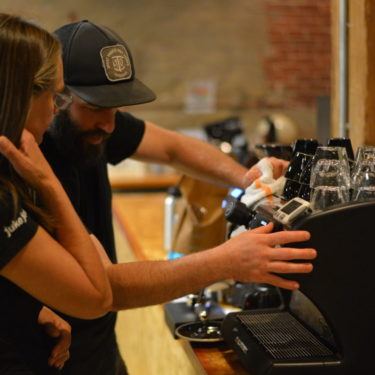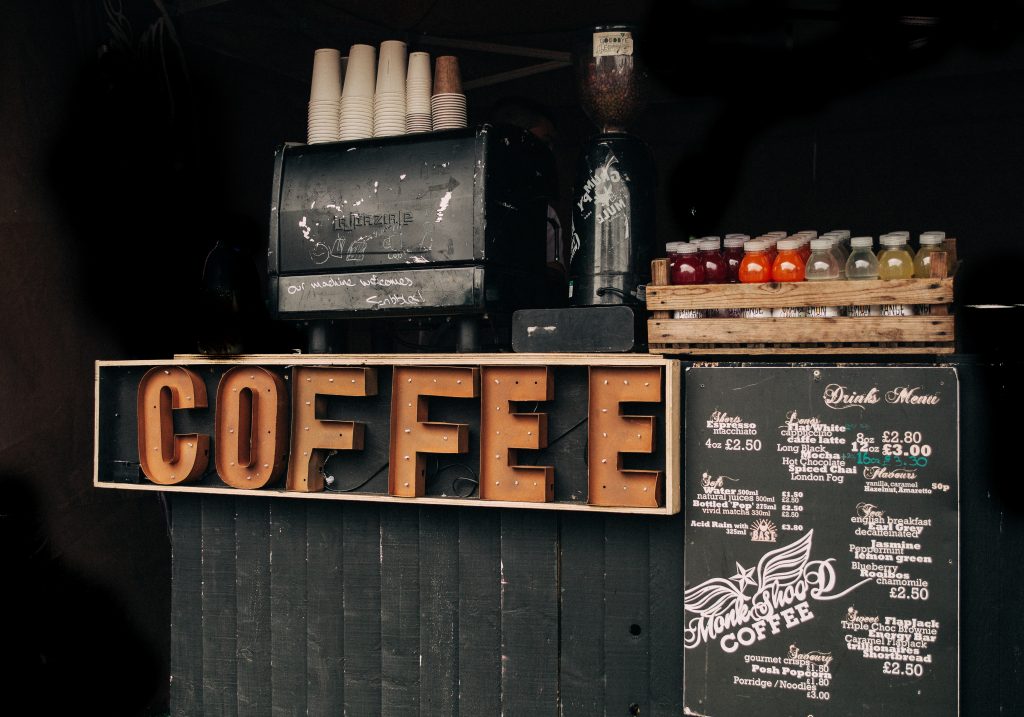Lots of people come to us with the question:
How much does it cost to open a coffee shop?
In general, like most things, it depends. That said, we have some answers and tips to help you understand how much it’ll cost YOU.
A version of this article was first published by James Harper on PerfectDailyGrind.com
Are you considering opening your own independent coffee shop but have a small budget to work with? Or maybe you’ve just launched and are looking for ways to make every dollar go as far as possible?
The startup expenses for a coffee shop can vary, but here are the numbers we see most often:
Full Coffee Bar
$150-$300k+
Coffee Drive-Through
$75-$250k+
Coffee Cart/Mobile Operation
$20-$75k+
It can take many months for your café to become cash flow positive. So, when you have limited resources, it takes an extra level of planning to ensure you don’t burn through your precious cash reserves. But this may be a blessing in disguise. It helps you think outside the box, be even more intentional with your offerings, and keeps you focused on profitability.
Our Vice President, Matt Milletto, recently spoke with the team at Perfect Daily Grind – “(Milletto is) one of the three presenters of the Coffee Business Start-Up Seminar at Coffee Fest Indianapolis, this 31st May to 2nd June. The event features a range of paid and free seminars, such as Opening a New Café? and Drink Menu Evolution: Make More With What’s In Your Store, as well as the Coffee Fest Latte Art World Championship Open and America‘s Best Espresso Competition.”
So, as you roll up your sleeves and begin the process of opening your café on a tight budget, consider the following points.
Don’t have time to read the entire article? Jump to the part in which you are most interested.
- Align Your Budget To Your Ambitions
- Seek Support Where You Need It
- Don’t Neglect Your Core Skills
- Maximize Sales Per Purchase & Sales Per Item
- Build Relationships With Customers
- Conclusion
Align Your Budget to Your Ambitions
Having a well-defined brand and concept is vital since it will ensure you stand out from the other coffee shops in your area. To come up with ideas, ask yourself a few things: what are the needs you’re solving for your potential customers? Do they need a space to take a breather from the office? Perhaps they’re yearning for a high-quality caffeine hit?
Now, ask yourself: can I create this concept with limited resources? “It’s really important to… create a concept that works without exceeding grossly [your] targeted budget,” says Matt.
A key constraint will be rent. “What’s worth considering is looking at an area that’s up and coming in development with other projects, [where] you might be able to take advantage of a lower lease rate or a cheaper build-out or something else that will allow the neighbourhood to grow around the business,” says Matt. Or, in a more established area, it would be wise to look at a smaller footprint area, such as kiosks, coffee carts, or a hole-in-the-wall shop.
Coffee shops are a volume business and it’s important you invest your scarce dollars to lay a foundation for growth. Consider how long items will last you and what you will be able to do without even as you expand.
“I think the equipment is one of the most important investments,” Matt advises. “I don’t recommend buying old, used equipment that you don’t know the service history on. It can become just a nightmare [if it breaks].”
At the same time, he recommends against purchasing a bigger machine than you need. A new, high-performance two-group espresso machine can comfortably make over 1,000 espressos a day. If you need to expand? “You may even just want to purchase a second two-group instead of trying to purchase a three or four-group machine right off the bat.”
Seek Support Where You Need It
“You can never be too confident or more competent in the early stages of your business,” says Matt. “It’s important to recognize your strengths and also… where hiring a professional would make sense.”
A robust business plan is critical to your success, especially if you have small cash reserves. If you struggle staying on top of financial plans, hire a Certified Public Accountant. It will eat up some of your precious capital, but it’s an essential investment to help you stay focused on achieving a sustainable income.
At the same time, do not underestimate the willingness of other small business owners, lawyers, and financial professionals to offer their time and advice to your project pro bono, especially when it aligns with their values. Matt believes that finding experienced professionals who can mentor you in your areas of weaknesses will help you achieve profitability.
Don’t Neglect Your Core Skills
When you become a coffee shop owner, you adopt many new hats: manager, marketer, financial planner, recruiter, health and safety advisor… Yet you cannot afford to neglect your key role, either: food and beverage provider.
In the specialty coffee industry, quality is king. But just purchasing specialty beans won’t guarantee your customers will taste a good coffee. Your coffee preparation knowledge, along with the skills of your baristas, is equally important.
“The most common mistake [is] not building confidence and competence within the [coffee] industry,” sighs Matt. “Hands-on training in espresso preparation and milk preparation are really the core foundation.”
Coffee training will reap you rewards beyond serving the best coffee in the neighborhood. “By being efficient in both portion control and training and saving for making a lot of mistakes, when you’re making 100, 200, 300 coffee drinks a day, all those little ways that you can be more efficient will really add up,” Matt tells me.
He says that saving a few pounds of espresso during dial-in might equate to US $7,000 savings per year. “You can invest that money into equipment or expanding or the menu,” he stresses.
Whether you’re looking to freshen up your skills behind the bar or have never touched a steam wand before, we offer classes to get you up to speed quickly. Practice on many of the top espresso machines in the industry and train with professionals.
See Our Barista Skills Workshops
Maximize Sales Per Purchase & Sales Per Item
It’s important that you promote multiple sales to maximize your per-person spend. Popular coffee shop wisdom states coffee shouldn’t be the majority of your weekly sales, with the rest being made up of non-coffee items, such as snacks and cold drinks. Why sell just a coffee when you can sell a coffee, muffin, and juice to the same person?
However, with a limited budget, you will struggle to afford a large inventory of slow-moving items. Additionally, you don’t want food to sit on shelves going stale. A few choice selections can be a more appealing and cost-effective strategy than trying to appeal to every taste and budget.
At the same time, consider how many offerings you can get out of a few simple ingredients. We all know that humble eggs can be used in a wide range of dishes, but don’t overlook your drinks menu either. Whether it’s blended drinks, homemade lemonades, or cold tea, often a unique menu can be created out of a few ingredients. Offerings like this can help you stand out from the crowd; the trick is to offer them without overextending yourself.
Build Relationships With Consumers
“Labour is going to be one of your biggest expenses,” cautions Matt. “You can save some of that cost by being very active yourself.” This is also great news from a marketing standpoint. Being present in the business helps you build authentic, direct connections with your customers and the wider community.
“Being engaged in your community is going to be, I think, that true benefit where people come to your shop five days a week,” Matt says.
But he recommends going further. “What I truly feel is most important is to really know your neighborhood better than anyone else and truly try to develop a loyalty and a long-term relationship with the immediate potential customers within a three to six block radius around you. Because that’s likely going to be, in many cases, 70% or so of your daily business, those repeat customers.”
In this environment, offering a loyalty card can be especially powerful. Your new customer’s face might light up when you hand them a fresh loyalty card with all the boxes already ticked off, so their next coffee is free. And those long-standing customers? A muffin on the house or even a branded mug can show that you appreciate them just as much as they do you.
Conclusion
When starting a coffee shop on a tight budget, you can turn your disadvantage into a competitive advantage. Can’t afford paid marketing? Become a pillar of your community through authentic word-of-mouth engagement. Can’t afford an expensive, high-traffic location? Focus on growing with a community in the long term while serving exceptional coffee.
This will be just the start of your journey in the fun and fast-paced coffee industry. As your cash coffers grow, you will be able to expand your business into many exciting directions.
More Articles for Coffee Shop Owners
How to Make Your Coffee Shop Profitable
The biggest hurdle for any new coffee shop: how to make money in coffee. There is a lot of potentially complex discussion we can have about this, but let’s try to make it simple. The most basic equation for profit is: Profit = Income – Expenses You’ve seen this equation before. You earn money and … How to Make Your Coffee Shop Profitable Read More »

